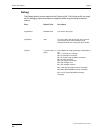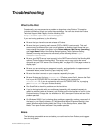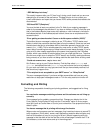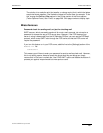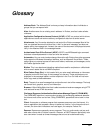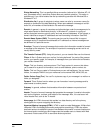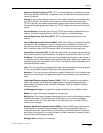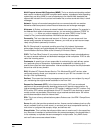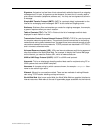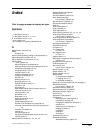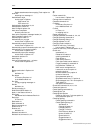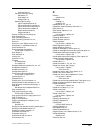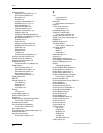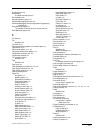
Glossary
290
QUALCOMM Incorporated
Multi-Purpose Internet Mail Extensions (MIME). The is an attachment decoding method
best used for recipients with MIME-compliant email readers, regardless of what operating
system they are using. MIME is a set of extensions to the Internet Mail standards that
supports the inclusion of multi-part and multimedia files, such as sound and video, in email
messages.
Network. A group of connected computers that can communicate with one another.
Networks enable computers to share files and resources and exchange messages.
Nickname. In Eudora, a nickname is entered instead of an email address. For example, in
the Address Book where nicknames are set up, you can enter the nickname TERRY for
terry@aol.com. When you write a message, you can enter TERRY in the To field
instead of Terry’s entire email address. Nicknames are also called aliases.
Personality. This is an alternate email account. In Eudora, you can access mail from
several email accounts at the same time. However, you must set up each account sepa-
rately using Eudora’s personality functions.
Ph. Ph (Phone book) is a protocol providing an online, fully indexed, fast access
white-pages directory service developed and freely distributed by the Computer and
Communications Services Office at the University of Illinois at Urbana.
POP3. The Post Office Protocol 3 is a protocol that provides a simple, standardized way
for users to access mailboxes and download messages to their computers. POP3 is also
called the Incoming server.
Postmaster. A special type of user responsible for maintaining the mail delivery system
for a particular group of computers. A postmaster is responsible for following up on
queries from users and other postmasters. Internet standards require that the postmaster
account be valid at every domain.
RAS. Windows NT Remote Access Service. This Windows 95 and NT service, when
configured correctly, allows your computer to connect to your ISP via a modem. You set
this up in Dial-Up Networking.
Redirect. This means that incoming messages can be sent to a new recipient “by way of”
you, maintaining the original sender’s address in the From field.
Request for Comments (RFC). In the Internet community, RFCs are a numbered
sequence of documents generally describing protocols for Internet communication. An
Internet standard protocol is also given a STD number in addition to an RFC number. Only
RFCs with a STD number are standards of the IETF. Some RFCs are historical or experi-
mental and are not standards. Others have not yet reached standard status. Still others
provide documentation about the Internet itself.
RPA. This is one of many authentication systems Eudora uses. Use RPA if CompuServe
is your ISP.
Server. An entity that provides a network service. A server can be hardware (such as a file
server), software (such as a mail server), or services (such as a transportation service). A
mail server is a program that accepts, relays, and delivers mail.
Shared folder. This is a folder that allows multiple users to receive mail in the same direc-
tory. Because all members of a shared folder can access messages in the shared folder, it
is not necessary to duplicate the same message for multiple users. Only IMAP clients
such as Eudora can access shared folders.



